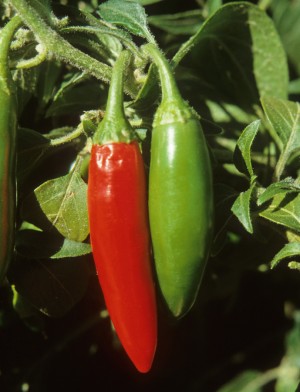By Dave DeWitt
Fiery Foods & BBQ Central Recommendations
Chile Pepper Bedding Plants… over 500 varieties from Cross Country Nurseries, shipping April to early June. Fresh pods ship September and early October. Go here
Chile Pepper Seeds… from all over the world from the Chile Pepper Institute. Go here
The Plant
In Spanish, serrano is an adjective which means “from the mountains.” The chile described by this adjective was first grown in the mountains of northern Puebla and Hidalgo, Mexico. Serranos vary in habit from compact to erect, have an intermediate number of stems, and grow from 1 ½ to 5 feet tall. The leaves vary from light to dark green, are pubescent (hairy), and measure 3 ½ to 5 inches long and 1 ½ to 2 inches wide. The flower corollas are white with no spots. The pods grow erect or pendant, are bluntly pointed, and measure between 1 and 4 inches long and ½ inch wide. Serranos measure between 10,000 and 20,000 Scoville Units.
Agriculture
Mexico has about 37,500 acres of serranos under cultivation, compared to only 150 acres in the United States, mostly in the Southwest. The states of Veracruz, Sinaloa, Nayarit, and Tamaulipas are the biggest producers of Mexican serrano chiles, growing about 180,000 tons of pods a year. Despite the proliferation of canned serranos, only 10 percent of the crop is processed. The vast majority is used fresh. A very small amount of red serranos is dried out for sale in markets. Recommended varieties are the Mexican cultivars ‘Altamira,’ ‘Panuco,’ and ‘Tampiqueño.’ In 1985, the Texas Agricultural Experiment Station released ‘Hidalgo,’ a mild, multiple virus resistant strain which is now popular in the U.S.
Cultivation
Serranos, grown extensively in Mexico, grow and fruit well in the home garden. The growing period is at least 90 days. The plant can produce up to 50 pods.
Post-Harvest Use
“These hot varieties are often eaten raw by native Mexicans, as are radishes,” wrote H.C. Irish in 1930. In Mexico, 90 percent of the crop is used fresh and the rest is canned. Serranos are most commonly used in fresh, pico de gallo-type salsas.
Recommended Varieties
- Serrano (Generic). Small, hot pods.
- TAM Hidalgo. Mildly pungent.





